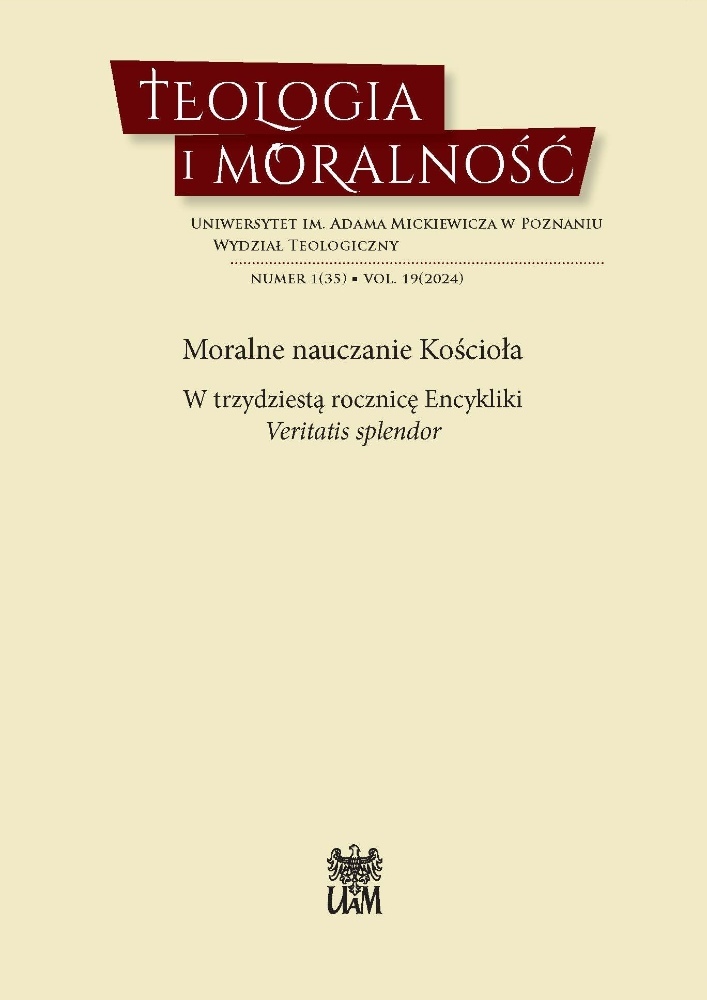Abstrakt
Josef Pieper (1904-1997) to niemiecki, katolicki filozof, jeden z głównych popularyzatorów myśli św. Tomasza z Akwinu w XX wieku. W artykule podjęta została analiza zagadnienia cnoty umiarkowania w ujęciu wspomnianego myśliciela. Zastosowane zostały następujące metody badawcze: krytyczna analizy źródeł oraz metoda dedukcyjna, aby następnie, za pomocą metody syntetycznej, uporządkować podjęte kwestie pod względem merytorycznym. Dla J. Piepera aktywność człowieka – ze względu na jego rozumność – winna być jednak ukierunkowana na dobro. Stąd konieczna jest dyscyplina wstrzemięźliwości. Osiągnięcie tego celu realizuje się poprzez czyn osoby. Wiąże się to z nieustannym wyborem dobra, opanowywaniem pożądliwości i niszczycielskiej siły grzechu. Całe życie człowieka jest związane z podejmowaniem trudu i zmagania na rzecz dojrzałości ludzkiej. Praktyka wstrzemięźliwości to w istocie realizacja osobowego ja, charakteryzującego się potrzebą zachowania swojej tożsamości jako bytu racjonalnego, duchowego. Praktykowanie umiarkowania prowadzi do wolności. Jest to wolność prawdziwej samorealizacji, wolność do spełnienia swego człowieczeństwa.
Bibliografia
Andrzejuk, Artur. 2000. Prawda o dobru. Warszawa: UKSW.
Cholewiński, Alfred. 2000. ABC chrześcijaństwa. Kraków: WAM.
Forrest, Thomas i Jose H. Prado Flores. 1991. Jezus Chrystus uzdrowiciel mojej osoby, tłum. Kamil Skorulski. Łódź: Diecezjalne Wydawnictwo Łódzkie.
Giertych, Wojciech. 2006. Jak żyć łaską. Płodność Boża w ludzkich czynach. Kraków: Wydawnictwo M.
Jan Paweł II. 1981. Adhortacja „Familiaris Consortio”.
Jan Paweł II. 1986. „Pierwszy grzech w dziejach człowieka: peccatum oryginale”. Audiencja Generalna. Rzym: 10.09.1986. L’Osservatore Romano, 9: 14.
Kępiński, Antoni. 1974. Lęk. Warszawa: Wydawnictwo Literackie.
Kożuchowski, Józef. 2001. „Filozofi a Josefa Piepera”, Studia Elbląskie, 3: 259-275.
Pieper, Josef. 1939. Zucht und Mass. Ueber die vierte Kardinaltugend. Leipzig: Verlag Beihegner.
Pieper, Josef. 1965a. The Four Cardinal Virtues: Prudence, Justice, Fortitude, Temperance. New York: Brace & World, Inc.
Pieper, Josef. 1965b. Traktat ueber die Klugheit. Muenchen: Koesel Verlag.
Pieper, Josef. 2000. O miłości, nadziei i wierze, tłum. Irena Gano i Krzysztof Michalski. Poznań: W drodze.
Schonborn, Christoph, Albert Gores i Robert Spaemann. 1997. Grzech pierworodny w nauczaniu Kościoła, tłum. Juliusz Zychowicz. Poznań: W drodze.
Sobór Watykański II. 1965. Konstytucja „Gaudium et spes”.
Rosik, Seweryn. 1992. Wezwania i wybory moralne. Refl eksje teologicznomoralne. Lublin: KUL.
Sarah, Robert. 2019. Wieczór się zbliża i dzień się już chyli (rozmowę przeprowadził Nicolas Diat), tłum. Agnieszka Kuryś. Warszawa: Wydawnictwo Sióstr Loretanek.
Szymański, Jacek. 2001. „Współczesne tendencje dewaluacji seksu”. Studia Włocławskie, 4: 304-312.
Tomasz z Akwinu. 1964. Suma teologiczna. Umiarkowanie (II-II, q. 141-170), t. 22, tłum. Stanisław Bełch. Londyn: Veritas.
Tomasz z Akwinu. 2009. Summa contra gentiles. Prawda wiary chrześcijańskiej w dyskusji z poganami, innowiercami i błądzącymi, tłum. Zofia Włodek i Włodzimierz Zega, t. 3. Poznań: W drodze.
Wojtyła, Karol. 1985. Osoba i czyn. Kraków: Polskie Towarzystwo Teologiczne.
Licencja
Prawa autorskie (c) 2024 Antoni Jucewicz

Utwór dostępny jest na licencji Creative Commons Uznanie autorstwa 4.0 Międzynarodowe.

